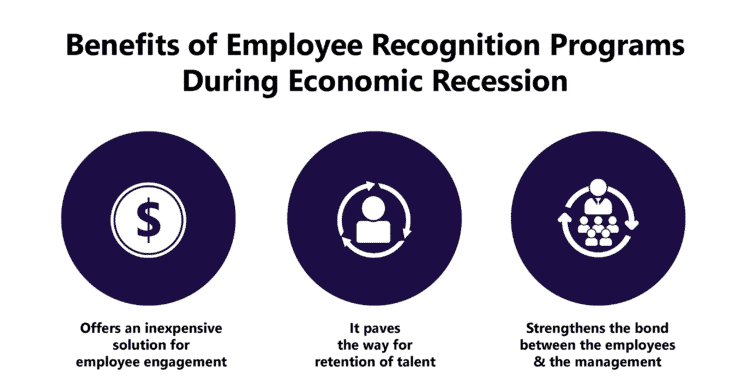1. Importance of Employee Recognition: During economic recessions, maintaining employee recognition programs is crucial for maintaining morale and retaining employee commitment, even when other benefits, such as bonuses and pay raises, are cut.
2. Cost-Effective Engagement: Recognition programs, including non-monetary rewards, offer inexpensive ways to sustain employee engagement and make them feel valued, even in the absence of financial incentives.
3. Retention of Top Talent: Continued recognition, even in small forms, helps retain high-performing employees by demonstrating that their contributions are still valued, fostering loyalty, and reducing turnover.
4. Strengthening Employee-Management Bonds: Recognition programs foster effective communication and emotional connections between employees and management, promoting trust and unity during challenging times.
Organizations often resort to recruitment freezes, layoffs, and pay cuts when there is a threat of an economic recession. Such measures drastically reduce employees’ motivation levels, exacerbating the situation. This article explores the impact and the business case for employee recognition during an economic recession.

During economically challenging times, organizations’ primary focus is to cut operational costs.
For this reason, most organizations discontinue any employee reward, recognition, and other welfare programs they might be running.
However, according to most HR experts, it might be counterproductive while trying to fight the recession.
They believe that employee recognition is critical for keeping the workforce motivated, especially when organizations need the most.
And all at a much lower cost than double-digit salary increments.
At the very least, a pat on the back or a ‘Thank You’ might help.

Organizations need to understand that the commitment of their employees can be vital to help them survive through the economic downturn.
Moreover, employees also understand that their employers are under tremendous pressure due to the drop in demand, sales, and profitability.

Hence any cuts in bonuses or expected pay raises are generally acceptable to employees during an economic slowdown.
However, a reduction in employee recognition is likely to affect the workforce morale and diminish their commitment and loyalty.

However, the program’s continuation can inspire employees to give their all to support their organization through this challenging phase.
James K. Harter, the chief scientist of workplace management and well-being at Gallup, says that in good times employee engagement is the difference between being good and being great, and in bad times it is the difference between surviving and not, which perfectly sums it up.
Given the importance of employee rewards and recognition programs during a recession, let’s take a look at their impact:


The thought behind the recognition holds significance for employees, extending beyond the financial value of rewards.
During a recession, when employees might be deprived of the usual financial benefits, they feel valued by the appreciation through the employee rewards and recognition program.
Read about 5 Low Budget Ideas for Employee Rewards and Recognition and 10 Best Non-Monetary Awards for Employee Recognition

The lack of additional financial benefits and perks during a downturn often makes the high-performing employees feel discouraged and disappointed,
However, the employee recognition program can make them feel that the organization still values their contributions.
Even if the recognition is provided only through words of praise or a certificate of appreciation, it can go a long way in making these top talented employees stay with the organization during tough times.
These employees tend to develop a deep sense of belonging to the organization, especially when it continues to appreciate and reward their efforts in some way, no matter how small the reward or recognition may seem.
Read about The Impact of Employee Rewards and Recognition on Retention

Employee reward and recognition programs often require the active participation of employees. It helps in improving their overall engagement with the organization.
Moreover, since these programs often involve the management, they help in establishing a channel of communication between the two.
The management shares their thoughts about the economic scenario, its impact, and the organization’s response to employees during such reward events.
It helps strengthen the bond between employees and management during these challenging times.
When it comes to keeping the members of the workforce motivated during an economic slowdown, employee recognition and rewards programs can prove to be one of the most cost-effective solutions for every organization.

Lead author: Sagar Chaudhuri, the Co-Founder and CEO of HiFives. He is an HR Tech Evangelist with over 25 years of experience in both corporate and entrepreneurial settings. Previously, Sagar has held leadership roles with companies such as Genpact, Infosys, and ICICI Bank. He has an engineering degree from IIT Kharagpur and an MBA from IIM Lucknow. Connect on LinkedIn
To stay updated on the latest HiFives blogs, follow us on Twitter (@MyHiFives)